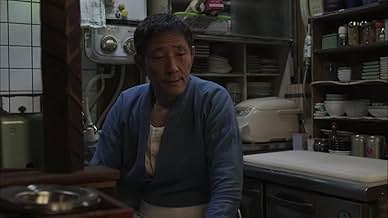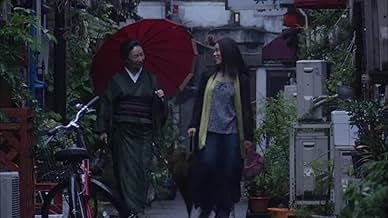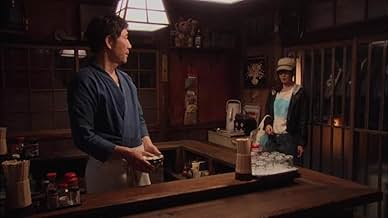Ajouter une intrigue dans votre langueSet in a small restaurant open only after midnight. This drama depicts the lives of the restaurant's patrons, who come for the amusing chatter and the proprietor's willingness to cook any di... Tout lireSet in a small restaurant open only after midnight. This drama depicts the lives of the restaurant's patrons, who come for the amusing chatter and the proprietor's willingness to cook any dish they request.Set in a small restaurant open only after midnight. This drama depicts the lives of the restaurant's patrons, who come for the amusing chatter and the proprietor's willingness to cook any dish they request.
- Prix
- 1 victoire au total
Parcourir les épisodes
Avis en vedette
I was hooked half-way through the first episode. I saw the word "kind" in another review here and, while it's not a word one usually associates with a TV series, kindness is one of the over-arching themes of the series. Kaoru Kobayashi, the main character (everyone calls him Master) has the kind of kindness that comes from inner strength, compassion, and wisdom.
The revolving ensemble of characters is wonderful. Great casting!
Sometimes the show seems to be a comedy, other times a drama, or a melancholy tale of unrequited.
Food, the sharing of, and the making of, is a important part of the show, as well. He cooks simple food, but every dish looks delicious!
I see the series was rebooted in 2019. I hope it, too, shows up on Netflix.
The show brings about a serene calm when you watch it. The delicate theme mixed with the intricately flavoured characters, makes it a bowl you just can't keep down.
Known in Japan as "Shinya Shokudo", this series is better known as "Midnight Diner" in the US.
The series itself is about the main character "The Master" who is a chef at a diner named Midnight Diner, which is only open from midnight till 7am. The supporting cast is filled with people from all walks of life, such as: hotel workers, cab drivers, exotic dancers, etc as they all order something to eat and drink, sit down and enjoy each other's company, as well as the stories that each customer has to tell.
The opening song to the series is a simple yet elegant Japanese folk song by the artist Tunekichi Suzuki. As you listen to the music it make you feel at ease and make you wonder what is he singing about.
The song titled "Omoide" is translated to "Memories," and by the way, the lyrics go by, he must be talking about memories of his own or memories of our own as we look into the sky. This fits well with Midnight Diner as in there is always a story to be told in a place you least expected and wonder what is that story is about. If you have the time.
It is on Netflix and is worth the watch.
The series itself is about the main character "The Master" who is a chef at a diner named Midnight Diner, which is only open from midnight till 7am. The supporting cast is filled with people from all walks of life, such as: hotel workers, cab drivers, exotic dancers, etc as they all order something to eat and drink, sit down and enjoy each other's company, as well as the stories that each customer has to tell.
The opening song to the series is a simple yet elegant Japanese folk song by the artist Tunekichi Suzuki. As you listen to the music it make you feel at ease and make you wonder what is he singing about.
The song titled "Omoide" is translated to "Memories," and by the way, the lyrics go by, he must be talking about memories of his own or memories of our own as we look into the sky. This fits well with Midnight Diner as in there is always a story to be told in a place you least expected and wonder what is that story is about. If you have the time.
It is on Netflix and is worth the watch.
8mcdt
Beware, there are two shows on Netflix with a similar name. They are basically the same, but presented separately. Midnight Diner: Tokyo Stories, has two seasons from 2016 and 2019, and was commissioned by Netflix, but the original three Midnight Diner seasons ran from 2009 to 2014. I didn't know the difference at first, and couldn't understand why Netflix couldn't remember which episode I last watched, and why the characters use old cellphones in one episode and then a more advanced one in the next! Anyway, regardless of which series you watch, these slow-moving episodes are delightful as you get familiar with the culture, food, eating habits and regular customers of the restaurant dubbed the Midnight Diner, which, as the title suggests, opens at midnight. The owner, known as "Master", is willing to prepare any dish, as long as he has the ingredients. There is a short cooking summary at the end, so stay tuned until the credits. There are recurrent characters in both shows, but each episode can also be a stand-alone. The episodes are short and low-key, so you can watch it to unwind after a hectic day.
I can certainly recommend this Japanese series. It brings to life a group of characters and their multi-dimensional life stories. They all are customers of a late night diner, and each story is told to completion, and matched to a favorite dish. It is a very slow but interesting way to tell a story.
Le saviez-vous
- AnecdotesThe show was actually produced in 5 series. However, since Netflix initially only had rights to the last 2 series (4 & 5 - as a producer) they were shown under a different name, Midnight Diner: Tokyo Stories. Then, when Netflix acquired rights to the first 3 series, they were listed with a different name, Midnight Diner. However, in fact, there really is only one show, filmed continuously over the 5 series.
- ConnexionsRemade as Shimyashikdang (2015)
Meilleurs choix
Connectez-vous pour évaluer et surveiller les recommandations personnalisées
Détails
- Date de sortie
- Pays d’origine
- Sites officiels
- Langue
- Aussi connu sous le nom de
- Midnight Diner
- sociétés de production
- Consultez plus de crédits d'entreprise sur IMDbPro
- Durée24 minutes
- Couleur
- Rapport de forme
- 1.78 : 1
Contribuer à cette page
Suggérer une modification ou ajouter du contenu manquant

Lacune principale
What is the Brazilian Portuguese language plot outline for Shinya shokudô (2009)?
Répondre










